CASTRES, FRANCE – The second weekend of the 2015 Six Nations offered, in order, an entertaining exhibition in London, a brutal and unforgiving war of attrition in Dublin, and a controversial heart-in-the-mouth thriller in Edinburgh. At the end of it all, there were more questions posed than answers offered as the competition goes cold for a fortnight.
England did what everyone expected in running in six tries to beat Italy 47-17 at Twickenham on Saturday. But, worryingly for coach Stuart Lancaster, they leaked three tries – and nine minutes into the second half, the score was a nail-biting 18-10.
It took a man who more than likely would not have been in the side but for injuries to Manu Tuilagi and Brad Barritt to ignite an England side that were stuttering badly in the face of a ferocious Italy.
Jonathan Joseph followed up his decisive try against Wales last weekend with a brace that could turn out to be even more important in the great scheme of this Six Nations.
Both were scored from 50m out: the first followed smart work at the breakdown from captain Chris Robshaw shortly before the half hour, who forced a turnover. Up popped the fleet-footed Joseph to burn through a gap in the Italian defence to score.
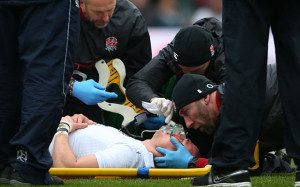
Joseph scored his second on the hour, when he made the most of a break in Italian ranks created when Bath clubmate George Ford delayed a pass for a crucial second. It left more than enough room for man-of-the-match Joseph.
Ford, too, had another decent game at 10. Concerns over his kicking game remain, but he has given England a very different creative edge that could be the undoing of better teams than Italy. There is fox-like cunning to go with the bludgeoning brute force now. It remains to be seen whether it will last beyond this Six Nations.
England stumbled early on, as they did in Cardiff as week earlier. Sergio Parisse stunned the vast majority of the 82,000 crowd at Twickenham in the fourth minute after Italy had stolen a Dylan Hartley line-out on halfway.
They were lucky not to fall further behind. Brown’s concussion was the price England paid to stop Masi from scoring after Kelly Haimona’s chip ahead, and Joseph did well to stop George Biagi passing to an unmarked Giovanbattista Venditti after an Italian turnover.
It took England 20 minutes to trouble the scoreboard. After Ford had opened the day’s account with a penalty, it fell to Billy Vunipola to score the first English try of the year at headquarters. It was a cleverly worked move, a short-side move after a feint to maul, but the outcome was far from clear-cut.
The massive number eight looked to have been held up in the corner – but the TMO decided after a lengthy wait that he had, in fact, managed to get the ball down while somehow staying in play.
The addition of Joseph’s first-half try meant that England went in to the break a barely deserved 15-5 up, and Ford extended their lead with the boot shortly after the restart. But Leonardo Sarto threatened an Italian renaissance when he caught his own kick ahead and avoided the attentions of both Dave Attwood and James Haskell before skirting out of the way of Watson to score.
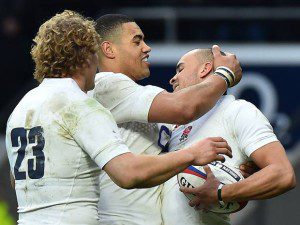
Ben Youngs was the first to benefit when Italian prop Martin Castrogiovanni was penalised at a 5m scrum after Robshaw had forced another turnover. The scrum-half darted over unopposed – apart from team-mate George Kruis, who had inadvertently threatened to get in the way.
Another penalty and Joseph’s second try were the signal for England to ring the changes. Danny Cipriani was barely 60 seconds into his first England appearance since November 2008 when he popped up to score the fifth try. Shortly after, Nick Easter become the oldest England try-scorer when he emerged from a mess of players at the bottom of a driving maul.
Luca Morisi had the final word – shrugging off the weak attentions of Jonny May to score and cap a dismal day out at Twickenham for the England man.
Ireland set up what looks awfully like a Six Nations decider against England on March 1 with a hard-fought 18-11 win over France at the Aviva Stadium – which has resulted in an outpouring of angry muttering among the long-suffering French media.
The returning Jonny Sexton was the difference between the two sides, who spent much of the game knocking lumps out of each other. Before the game, France coach Philippe Saint-Andre had said his side would target the Racing Metro man, who had just completed a mandatory 12-week stand down period following a series of concussions in 2014, the first of which was sustained against France in the last Six Nations.
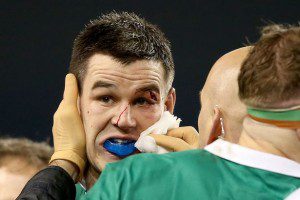
It was Ireland’s ninth win in as many games, their fourth in a row over France, and only a brave punter would be tempted to bet on Les Bleus when the sides meet in the World Cup later this year.
The game opened as it would continue, with Bastareaud – filled to the brim with sound and fury – charging into Sexton at full tilt. The Irishman’s head rocked back and the air pressure around the whole of the country dipped as collective breath was hissed inwards.
No matter. Sexton shrugged off the hit and would soon nail a penalty from out wide amid deafening silence in the Aviva.
While opposing 10s Camille Lopez and Sexton traded penalties, first Wesley Fofana left the field with suspected concussion. He returned, having being passed fit under rugby’s concussion protocols, in time to see Teddy Thomas limp off the Aviva pitch for good.
The pair continued to trade kicks as Pascal Papé pounded a knee into Jamie Heaslip’s back and was sin-binned, and when Scott Spedding left the field with concussion, to be replaced by Castres’ fly-half Remi Tales.
Papé has since been cited and could miss the rest of the Six Nations, while Ireland are hoping the influential Heaslip will recover in time for the match against England.
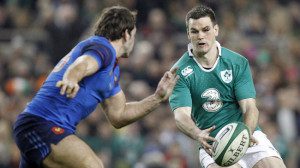
France had changed their entire front row early in the second half – bringing on New Zealand-born 336lb Monstre Rochelais Uini Atonio, Clermont hooker Benjamin Kayser and brutal Belgian prop Vincent Debaty.
The change – coupled with the long-overdue entrance of Morgan Parra at scrum-half after 65 minutes – marked the start of a French onslaught that threatened a remarkable comeback. But it was not to be. And it has given Les Bleus’ many critics plenty of ammunition.
Scotland are furiously rueing more than a few of the decisions made by New Zealand referee Glen Jackson following their heart-breaking 23-26 defeat to Wales at Murrayfield in the closing game of the second Six Nations weekend.
Mr Jackson probably should have checked with the TMO before ruling Greig Laidlaw’s dive for the line just before halftime ended just short.
He maybe should have thought a little harder about whether Wales’s last defender Liam Williams should have been sin-binned for a high-tackle when he disallowed Mark Bennett a late-late try for a knock-on – and, if so, whether a penalty try may have been in order.
Perhaps, too, Finn Russell should have seen more than yellow for an aerial challenge for which he has since been cited.
And was the final whistle just a little premature? Scotland fans will tell you it was, especially as Russell had just nailed the conversion that brought the home side to within three points.
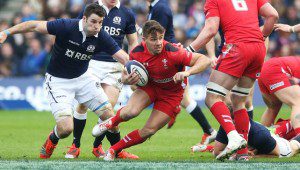
Scotland gave up three penalties in the first five minutes. Fortunately for them, only one was in Leigh Halfpenny’s range. But, after he had kicked the visitors into the lead, Stuart Hogg raced 60m to score the opening try under the posts after Richie Gray had picked up a turnover.
Captain Laidlaw converted on a perfect afternoon with the boot for the Scottish scrum-half. But two more Halfpenny penalties and a slick try from Welsh scrum-half Rhys Webb, with Russell in the bin following his aerial challenge on Williams, gave the visitors a 16-10 halftime lead.
But Williams was denied a try in the second half for an off-the-ball infringement by Alun Wyn Jones – and Halfpenny’s radar went unusually awry to give the Scots hope.
That was until British and Irish Lion Jonathan Davies latched on to a Dan Biggar pass at full pace, powered his way through some ineffective midfield tackling to coast under the posts and leave Halfpenny with the simplest of conversions to give Wales a 10-point lead.
It wasn’t quite over. Scotland’s replacement prop Jon Welsh wheezed over in the final minute. Russell converted, but the referee decided there was no time to restart the game.
Feel free to add your thoughts below, please look for and “Like” our Facebook Rugby Wrap Up Page and follow us on Twitter@ :RugbyWrapUp, Junoir Blaber, Nick Hall, James Harrington, Jamie Wall, Jaime Loyd, DJ Eberle, Cody Kuxmann, Karen Ritter, Scheenagh Harrington, Jake Frechette and Declan Yeats, respectively.

